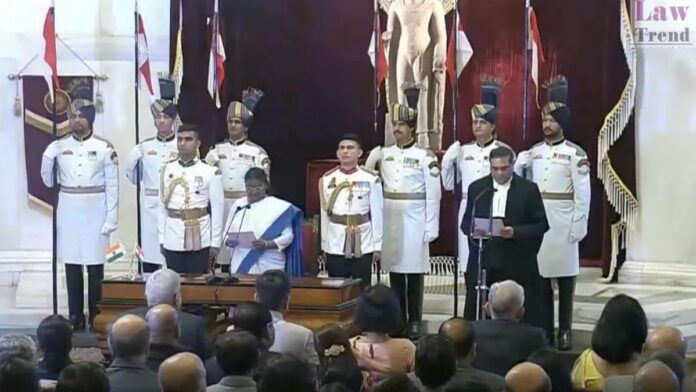Justice Sanjiv Khanna was formally sworn in as the 51st Chief Justice of India (CJI) today, marking the beginning of his six-month tenure as the country’s top judicial authority. Appointed following the recommendation of his predecessor, Chief Justice Dhananjaya Yeshwant Chandrachud, Justice Khanna will lead the judiciary until his retirement on May 13, 2025, at the mandated retirement age of 65 for Supreme Court judges.
Justice Khanna has already made substantial contributions to the judiciary. He currently serves as the executive chairman of the National Legal Services Authority (NALSA), where he has advanced initiatives to improve access to justice for marginalized groups. Additionally, as a member of the governing council of the National Judicial Academy (NJA) in Bhopal, he has played a role in enhancing judicial training and development.
At a farewell event organized by the Supreme Court Bar Association (SCBA) for Justice Chandrachud, Justice Khanna expressed his admiration and respect for his predecessor. In an emotional address, he remarked on the “emptiness” that Justice Chandrachud’s departure would leave in the Supreme Court, lauding his predecessor’s dedication to transforming the judiciary into a more inclusive institution.

Who is Justice Sanjiv Khanna?
Justice Sanjiv Khanna, born on May 14, 1960, comes from a family with deep judicial roots; his father, the late Justice Dev Raj Khanna, was a former judge of the Delhi High Court. Justice Khanna completed his education at Delhi’s Modern School, Barakhamba Road, and graduated from the University of Delhi in 1980. He went on to study law at the Campus Law Centre, University of Delhi.
Justice Khanna’s legal career began in 1983, when he enrolled as an advocate with the Bar Council of Delhi. He practiced extensively in the District Courts at Tis Hazari and later in the Delhi High Court, handling a broad spectrum of cases, including public law writ petitions, direct tax appeals, arbitration, commercial suits, environmental law, consumer rights, and corporate law matters. In 2004, he was appointed as standing counsel (civil) for the National Capital Territory of Delhi and later served as an additional public prosecutor and amicus curiae in numerous criminal cases.
In 2005, Justice Khanna was elevated as an additional judge of the Delhi High Court and became a permanent judge the following year. Throughout his tenure, he held significant positions, including chairman of the Delhi Judicial Academy and the Delhi International Arbitration Centre.
In 2019, Justice Khanna was elevated to the Supreme Court, bypassing the traditional path of serving as a high court chief justice. His time on the Supreme Court bench has been marked by several landmark rulings that have shaped India’s legal landscape.
Key Judgments of Justice Sanjiv Khanna
Justice Khanna’s Supreme Court tenure includes many high-profile cases. He was a part of the Constitution Bench that declared the electoral bond scheme, a controversial method for funding political parties, unconstitutional. He also played a key role on the bench that upheld the abrogation of Article 370, a pivotal decision that altered the special status of Jammu and Kashmir.
A Vision for the Judiciary
As the new Chief Justice of India, Justice Khanna is expected to focus on reducing case backlogs, improving judicial infrastructure, and implementing technological advancements within the judiciary. His tenure is anticipated to reflect his commitment to inclusive and accessible justice, reinforced by his experience with NALSA.
Justice Khanna’s six-month tenure as Chief Justice promises to build on the reformist vision of his predecessor, Justice Chandrachud, aiming to make the judiciary more accessible and efficient while upholding the rule of law and constitutional values.







